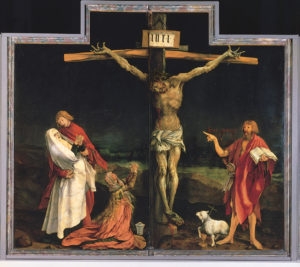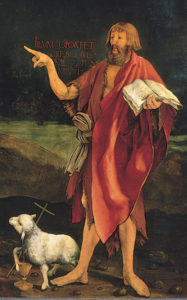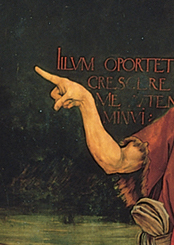Interview with Tom Kuhn: Part 3
Tom Kuhn is Professor of Twentieth-Century German Literature and Fellow of St Hugh’s College. His main research interests are in political literature in the 20th century. He has worked particularly on Bertolt Brecht, and is the series editor of the main English-language edition of Brecht’s works.
Connections to the GCSE, AS and A level specifications
- Innovations
- Significant moments in the development of theory and practice
- Social, cultural, political and historical context
- Influence
- Use of theatrical conventions
PC: Can we talk about Brecht’s Short Organon, which is the most distilled collection of his ideas for the theatre?
TK: Yes. So, when the war ends he starts to think much more seriously about returning to Europe. That’s when he formulates his ideas in this most complete way. I think that is because he has the sense that culture has been derailed in Europe. There is a need to rebuild the theatre houses physically but also to rebuild the content of the theatres. He wants to put his mark on that process, and so the Short Organon is his calling card: “Look. I’ve got some ideas, these are my ideas, lets do it this way.” That’s why he formulated it all so clearly. That is all it is, if it hadn’t been for those circumstances he might not have written his ideas in such a way. We do him a disservice by taking the Short Organon out of that context and treating it as though it was somehow a Brecht bible. It’s much more a template in response to the conditions of post-war European theatre.
PC: Does the importance of his context and circumstances pose difficulties for replicating his ideas?
TK: Yes. It is very hard to think in terms of replication, simply because we can’t go back to that historical moment. Some of the basic outward features of Brechtian theatre – the visible theatre apparatus, changing the scene in such a way that we can see, and actors stepping in and out of role, they are pretty commonplace. Anyone who goes to anything serious in the theatre would probably see an example of that, maybe even in a production of Ibsen and certainly in lots of other theatre productions. That is partly because Brecht just won that argument and nobody really tries to create a complete illusion of reality any longer. They do in film, although film goes in both directions in a quite confusing way and is difficult to generalise about, but some film tries to just create the world as perfectly as possible. No theatre really does that any longer. This is partly because films supplanted that function of the theatre and partly because Brecht showed us a different way of making theatre. So then, if students already have that sense that if you go to the theatre of course you know you’re in the theatre and you don’t have an illusion of reality, then Brecht doesn’t seem anything special or particular, you can’t replicate the historical impact of Brechtian theatre, simply because it has become the new normal, it is just what you see all the time anyway.
PC: I think a lot of young people don’t have that experience of the theatre. What they do have is the experience of the cinema that you talk about. So Brecht still has that feeling of something quite revolutionary. That’s why his ideas are so attractive to teachers: they don’t need a lot in the way of resources and they challenge young people be more analytical and reflective about the process and content of their work.
You mentioned the basic outward features being quite commonplace would you also agree that lots of his ideas were in existence in Ancient Greek theatre, Büchner’s Woyzeck and Shakespeare?
TK: Yes. It is indeed all there in Shakespeare. But everything is all there in Shakespeare! Shakespeare has plays within plays, he has prologues, he has singers, as it were at the front with their fingers pointing, that say “Oh for a muse of fire …”: all of these sorts of things point out the particular constraints and potentials of theatre:
Can this cockpit hold
The vasty fields of France? Or may we cram
Within this wooden O the very casques
That did affright the air at Agincourt?
The beginning of Henry V has the same sort of self-conscious reflection that Brecht is saying: “Let’s make it all clear that we’re in a theatre and this is pretence.”
Brecht is eclectic, he draws on the idea of chorus in particular from the Greeks and he draws on the early-modern, Shakespearean theatre. What he doesn’t want is the 19th century. Woyzeck is a bit of an exception in that it doesn’t look like other 19th century plays, and of course Woyzeck is an unfinished play and there is an extent to which you can project on to it whatever you want. So that when the play was rediscovered at the end of the 19th century, first of all the Naturalists thought that they were following Büchner, then the Expressionists thought that they were following Büchner, then Brecht thought that he was following Büchner. They all took what they wanted from Büchner.
PC: And it was the only external text referred to by Antonin Artaud.
TK: Yes. I think a lot of Germans and especially Brecht thought that it was a way of saying, we’re not being Schiller, and putting down a marker: we’re not trying to do Schillerian theatre here. I think Büchner is wonderful, and Woyzeck a great play. We’ll never know how much of the sort of fragmentary and broken nature of the text (which obviously appealed to Brecht, with his idea of the scenes not being fluidly arranged in a compelling plot) how much of that is down to the fact that he didn’t finish it, and how much of it is down to a really rather revolutionary dramatic imagination?
PC: It is almost the opposite of the theatre maker who has the inclination to write their thoughts and ideas down. Do you think that Brecht wished he could have been that enigmatic?
TK: No. I think, for Brecht, the alternation between rationalising reflection and much more unfettered creativity, that back and forth, is an essential part. You can’t imagine the one without the other. But Büchner was also a young man, he wasn’t really practiced in his art, he didn’t know what worked so he produced things that didn’t work. That didn’t work then. Which later generations discovered as a revelation for the modern theatre, it is a bit of a historical accident. A wonderful historical accident.
PC: It is interesting to think about that in the secondary school classroom: drama teachers aim to cultivate the environment for creativity and reflection, the back and forth. But they also believe that young people can challenge ideas of theatre by creating things that seem, at first, not to work.
Summary
- Brecht’s Short Organon a template in response to the conditions of post-war European theatre.
- Nobody really tries to create a complete illusion of reality in the theatre any longer.
- The lack of illusion in modern theatre is because Brecht won his argument but also because film and television serve that purpose now.
- Brecht’s ideas for theatre can still seem revolutionary for young people who are more exposed to film and TV than theatre.
- Brecht’s ideas were heavily influenced by Ancient Greek theatre, Shakespearean theatre and Georg Büchner’s Woyzeck.
- Brecht was eclectic and drew from almost everything, apart from 19th century Naturalism.



